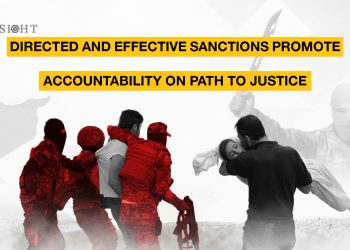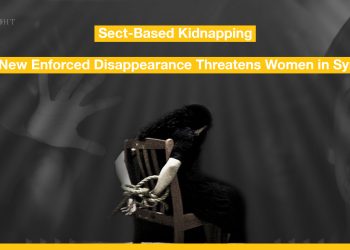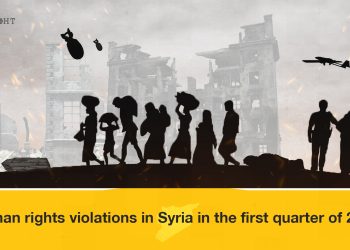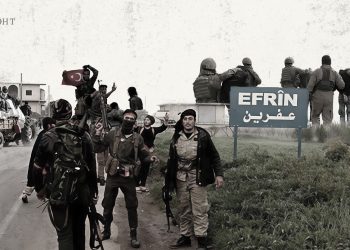Turkey launched military attacks on north Syria between October 23rd and 26th ,2024, without committing to the principle of distinction between civilian objects and military objectives, and partially or completely destroyed the region’s infrastructure and basic services.
The Turkish army did not engage with military forces, rather it launched violent attacks by warplanes, drones and artilleries on inhabited areas, service institutions and police (internal security forces) stations.
The Turkish army killed and injured 62 civilians, who are all vulnerable people – children, women, displaced people and workers. It also killed and injured 18 members of the internal security forces.
The Turkish army hit 205 sites within Syrian territory managed by the Autonomous Administration. This briefing reveals that the majority of the targets were residential areas, infrastructure, and service institutions, as well as 16 center of internal security forces and a military point of Government forces.
These heavy strikes have caused extensive damage to electricity, water, bread and fuel resources, that are already fragile because of the country’s 13-year war and the destruction caused by previous Turkish shelling. The strikes also resulted in suspension of education process in schools and work in some health centers.
INSIGHT’s monitoring and documentation team prepared this briefing after it interviewed and contacted with victims, their relatives, and gathered testimonies from local activists and media professionals in the areas targeted by the Turkish strikes.
This briefing reveals the victims’ gender and categories. We did not disclose victims’ names to avoid causing harm to victims in these difficult times for them and their families.
Turkey’s Ministry of Defense said it had launched the attacks in response to an attack by ‘PKK’ fighters in Ankara, as the Turkish government assume that the SDF is linked to ‘Kurdistan Workers’ Party’.
However, the victims’ identities and the services targeted in the attacks, documented by INSIGHT, show that Turkey’s targets are vulnerable and affected by previous war incidents in the country.
The Attacks demonstrate Turkey’s deliberate subjection of more than three million Syrians in north and east Syria to living conditions intended to destroying them, as well as the killing of number of individuals for being Kurds or living in a particular area.
The documents compiled by INSIGHT during the four days and matching them with Turkish statements, confirm that Turkey has committed violations that amount to war crimes and crimes against humanity according to international laws, customs and conventions such as international humanitarian law, customary international humanitarian law, the Geneva Convention of 1949 and its Additional Protocols.
Civilian casualties
Turkish strikes killed 14 civilians in their homes and businesses, in displaced people’s camps, and 4 members of the internal security forces in their positions and road checkpoints.
The civilian victims were 9 men, 7 workers at Swaidiya gas plant and 2 civilians in Tal Rif’at, north of Aleppo, who were displaced persons fled from Rajo district in Afrin in the 2018 Turkish operation “Olive Branch”.
Also, 2 women were killed. They were in their house in Tal Rif’at when the Turkish strikes hit them. One woman was killed with her daughter and the other woman was killed with her husband.
Among the killed civilians were 3 children, 2 of them (5 years and 11 years old), each were sheltering in their families’ homes; one in Tal Rif’at, and the other in Manbij, northeast of Aleppo. The third child, 17 was killed during his work in Swaidiya gas plant in the countryside of Derik.
Injured Civilians
48 civilians and 14 military and internal security forces’ members were injured, amid continuing concerns during treating them over constant strikes on health facilities and civilians who volunteered to take the injured people to the hospital.
The injured civilians were 32 men, including 14 workers at the Swaidiya gas plant, and 6 civilian men were injured by the strikes on the educational curriculum institution, when they were attempting to take the injured members of the internal security forces’ center, adjacent to the institution, to the hospital.
One of the injured civilians, Alan, said that he could not stand watching his injured friend (an internal forces member) without rushing him to the hospital.
Alan added that he and the other paramedics were injured in the following strikes. They were taken to a hospital in Amuda and then to the hospitals in Qamishli for treatment.
The Turkish shelling on wheat silos in ‘Rovi’ village in Kobani injured 7 workers there. Also, 2 displaced persons in their houses in Tal Rifaat and 1 displaced elderly (63) in nearby ‘Sardam’ camp were injured, and another 2 civilian men, each in their homes, one in countryside of Tal Tamer and the other in countryside of Manbij.
The shelling also injured 3 women, 2 displaced women in two houses in Tal Rifaat (the father of one of them was killed in the same shelling), 1 displaced woman in ‘Newroz’ camp was injured at her work in ‘Zozan’ dairy factory in Derik, and 1 woman in ‘Agibesh’ village in Tal Tamer countryside.
In the Turkish attacks, 13 children were injured. Those children are: 2 displaced children (14 and 17) were injured during their work in the dairy factory in Derik, 2 displaced children (3 and 10 years) were injured in their family’s home in Tal Rifaat (their mother and sister were killed in the same shelling), and 2 children (13 and 8 years) in Manbij (their baby sister was killed in the same shelling).
And 3 children (5,5, and 15) were injured in their houses in countryside of Manbij, 1 child (3 years) in her home in Kobani, 1 child (5 years) in his home in Tal Rifaat, 1 child (8 years) in his house in Tal Tamer, and 1 child (13) in Amuda.
Although the International Independent Commission of Inquiry on Syria, in its March 2024 report, had classified some of Turkey’s violations in northeast Syria as war crimes, there are no signs of prosecution or attempt to condemn the Turkish government and stop it from committing the violations.

Displaced people’s homes and shelters
In three days, Turkish forces shelled 137 residential areas with hundreds of strikes, including a displaced people’s camp. The strikes resulted in total or partial destruction of the homes of civilians who considered remaining inside their homes and tents to be the safest act during the shelling.
The Autonomous Administration controlled-areas are home to hundreds of thousands of internally displaced people. The majority fled from previous Turkish military operations in Afrin in 2018, Sere Kaniye and Gire Spi in 2019, and later escalation campaigns on the contact lines in Ayn Issa in north of Raqqa and Tal Tamer in north of Hasakah.
On Wednesday, October 23rd, around 8 p.m., the Turkish forces shelled displaced people’s homes in center of Tal Rifaat with artillery shelling, including a home of a family from ‘Mabata’ district in Afrin, who fled the war in 2018.
A witness said that Malak, 5 years old, and her mother were killed in the Turkish shelling, and her two child brothers were injured.
She added that rest of the family members had to go to and from the hospital and their relatives’ home in Tal Rifaat.
In the same evening, another home in Tal Rifaat was shelled, in which a man and his wife were killed, who were also displaced from ‘Sharan’ district in Afrin, and two displaced brothers were injured in a third home.
Another witness told INSIGHT that Turkish forces had targeted ‘Sardam camp, in ‘Tal Sosin’ town, and nearby farms with 10 missiles.
The witness added that a person called Mohammed Abdul Karim Sido (43) died of a heart attack during the shelling, as he was told by his relatives (he was not listed among the victims killed by the Turkish shelling and documented by INSIGHT).
Later on Thursday night, October 24th, the Turkish forces targeted a house in ‘al-Baniya’ village, north-east of Manbij, with artillery shelling. It resulted in the killing of a child and injury of her two child brothers.
INSIGHT obtained photos and videos of that targeted house, and communicated with the media professionals who captured them for verification. The photos and videos showed complete destruction of the house, confirming the attackers’ intention of violent destruction leading to the killing.
The total destruction of the house proves the Turkish forces’ involvement by targeting the house directly, even though the family have always been living in it, according to a resident of the village.
Turkey targeted 6 economic facilities, some of which support the work of displaced people in the region.
On October 26th, Turkish drones shelled ‘Zozan’ dairy factory in Derik, injuring 3 displaced women workers, two of them are under 18.
One of the injured women workers, Amal, said that she cleaned the milk tank and went out of the factory towards the gate to take some milk and put it inside when the shelling started and the door fell on her.
She added that all the women panicked, and she and two other women workers had been taken to the hospital.

Basic Services
The Turkish attacks targeted infrastructure and public and private economic facilities in the region, which have not yet been restored from long-term repercussions of the destruction caused by Turkey’s previous attacks at the end of 2023 and the beginning of 2024.
The Turkish strikes hit 11 public service facilities, which are: 3 health facilities in Qamishli, Rimelan and Kobani, an education authority facility in Amuda, a communication center in Derbasiyeh and an inland crossing with the Turkish-backed ‘National Army’ controlled-areas in Aleppo countryside.
150 thousand families were effected of the destruction of 4 power plants, according to the Autonomous Administration’s Energy Authority.
The Turkish strikes also targeted 7 wheat storage and bread production centers (bakeries, mills and silos).
Immediately, the shelling caused increase in the price of some bread items in city markets, worsened shortages of fuel, electricity, cooking gas and water, suspended education process in schools and restricted the movement of ambulance, firefighters and rescue crews.
One of the firefighters in Amuda, Khaled, said they had gone to put out fires that burst out due to the shelling of sites in the city by Turkish drones on Saturday, October 26.
The firefighter confirmed that the next strikes on paramedics and firefighters were by a warplane.
Turkey bombed 16 fuel production centers and plants, including the region’s only cooking gas plant.
The Turkish strikes in mid-January had caused an increase in the price of the domestic gas cylinder, from 8000 Syrian pounds to US $ 10 (more than 150 thousand Syrian pounds), later the price was reduced by the Autonomous Administration to 100 thousand Syrian pounds after partial restoration of the plant.
Then (in January), the destruction of power plants caused the public power outage in cities and countryside, and still.
The destructive attacks indicate that Turkey is attempting to intentionally subjugate the inhabitants of these areas who do not participate in hostilities into worsening living conditions.
Power plants, the Swaidiya gas plant, bakeries and health facilities, cannot be considered sources of funding for any military or political party, because the affected people are more than 3 million residents. Also, the fuel and gas are taken to other zones of influence.
Recommendations:
- The international community must exert diplomatic pressure on Turkey to abide by international laws and stop the systematic attacks on northeast Syria.
- Humanitarian organizations should provide immediate assistance to the population affected by the Turkish attacks, including the providing alternative energy and resources to meet the needs of daily life and basic services.
- The international community and organizations should provide financial and technical support for the reconstruction of facilities affected by the attacks, as well as support for maintenance efforts to sustain the infrastructure.
- An independent and transparent international investigation should be conducted into Turkey’s attacks and its violation of international humanitarian law, to hold accountable those responsible for any war crimes or human rights violations.
- The international community must strengthen the international protection of the civilian population in the affected areas and ensure that they are adequately protected against unjustified military attacks.
- All parties to the conflict should commit to protect civilians and prevent targeting civilian objects, along with international humanitarian and human rights law.
- Arab and international bodies should urge the various parties to the conflict to dialogue as a means of solutions and to support the negotiations between the Syrian Government, the opposition ‘National Army’ and the Turkish Government, in order to spare Syrians the scourge of war in general.
the full report: Turkey kills civilians and destroy infrastructure in northeast Syria






